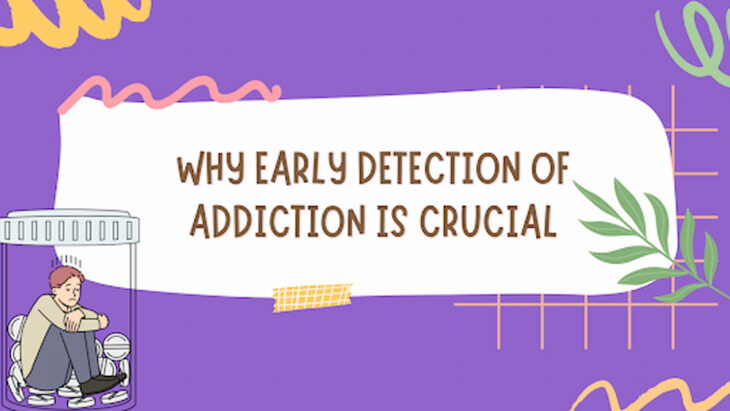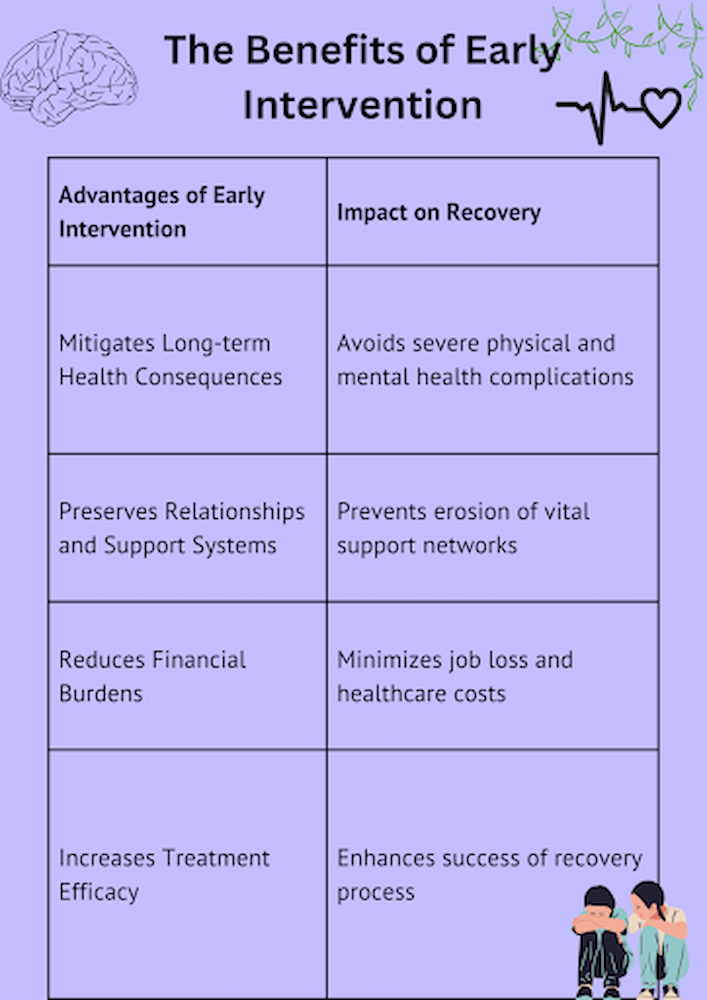Disclosure: Articles may contain affiliate links. As an Amazon Associate, we earn from qualifying purchases (at no additional cost to you). See our full disclosure here.
Last updated on April 28th, 2024 at 12:52 pm
The following content is for informational purposes only. This article is not intended to be a substitute for professional medical advice, diagnosis, or treatment.
You probably know that addiction is a growing problem. And, this ruthless adversary has a staggering impact on public health–in 2021 alone, over 100,000 drug overdose deaths were reported in the United States.
This marks a significant increase and highlights the grave consequences addiction can have on the lives of those addicted and their loved ones. Detecting addiction early is vital—it’s a chance to reclaim control and change outcomes for the better.

In this article, we’ll uncover why spotting the signs of addiction early on matters and how early intervention can pave the way for a brighter future.
The Many Faces of Addiction: Why Detecting Addiction Early Matters
Addiction can take many forms, each with its own set of challenges and consequences. Early detection is paramount across all types of addiction to prevent further damage and increase the chances of a successful recovery.
Substance Addictions
Drug Addiction: Whether it’s prescription medications, illicit substances, or even over-the-counter drugs, drug addiction can quickly spiral out of control, leading to severe health issues, legal troubles, and even overdose fatalities. Early detection can prevent long-term physiological harm and provide access to life-saving treatment before it’s too late.
Alcohol Addiction: Often perceived as more socially acceptable, alcohol addiction can be just as destructive as addictions to other drugs. Early intervention can mitigate the risk of liver disease, brain damage, and the potential for alcohol-fueled accidents or violence. Recognizing the signs of alcohol abuse and addiction early can prevent irreparable damage to your health, relationships, and overall well-being.
Behavioral Addictions
Internet and Gaming Addictions: In today’s “online” world, these addictions are on the rise, particularly among the younger generations. Excessive social media use and gaming can disrupt normal development, academic or professional performance, and social functioning. Early detection is key to addressing these issues before they become ingrained and lead to severe consequences.
Other Behavioral Addictions: Addictions to activities like gambling, shopping, or even exercise can have devastating financial, emotional, and physical impacts. Early intervention can provide the necessary support and coping strategies before these addictions become all-consuming.
Regardless of the type of addiction, timely detection is crucial to minimizing harm, increasing the efficacy of treatment, and empowering addicts to reclaim control over their lives. By recognizing the signs early and seeking help, we increase the odds of a healthier, more fulfilling future.

The Perilous Path of Undetected Addiction
Failing to detect addiction early can lead to severe consequences that can profoundly impact every aspect of your or your loved one’s life. Undetected addiction can lead to physical and mental health issues like organ damage, cognitive impairment, depression, and anxiety–an overall inability to function well mentally and physically.
The financial toll can be crippling too, with job loss, legal troubles, and mounting healthcare costs draining resources and exacerbating stress. Relationships and social connections suffer as trust erodes, communication breaks down, and loved ones distance themselves, leading to isolation.
Tragically, undetected addiction increases the risk of overdose, accidents, and suicide, robbing individuals of their futures and shattering families and communities.
Early detection empowers individuals to take control before addiction tightens its grip. It opens the door to effective treatment, support, and reclaiming relationships, health, and overall well-being.

The Benefits of Early Intervention
The advantages of early detection and intervention cannot be overstated. When addiction is caught and addressed early, the chances of successful recovery increase significantly. Early intervention can:
Mitigate long-term health consequences: By addressing addiction promptly, it’s more likely that the severe physical and mental health complications that often accompany prolonged substance abuse or addictive behaviors can be avoided.
Preserve relationships and support systems: Early intervention can prevent the erosion of relationships and support networks, which are crucial for successful recovery and maintaining a sense of connection and purpose.
Reduce financial burdens: Untreated addiction can lead to job loss, legal troubles, and mounting healthcare costs that can strain finances. Early intervention can minimize these financial strains, allowing for a focus on recovery without added stress.
Increase treatment efficacy: The earlier addiction is addressed, the more effective the treatment is likely to be, as the brain and body have not yet undergone profound changes due to prolonged substance abuse, making the recovery process more likely to succeed.
The transformative power of early intervention is evident in numerous success stories of individuals who sought help early and reclaimed their lives. By taking that crucial step, it’s possible to overcome addiction and live a fulfilling, purpose-driven life.
Recognizing the Signs: What to Look Out For
To harness the power of early detection, it’s crucial to be aware of the warning signs. While signs vary based on the substance or behavior, some common indicators include:
Physical Changes:
- Sudden weight fluctuations
- Deteriorating hygiene
- Altered sleep patterns or appetite
Behavioral Shifts:
- Withdrawal from social activities
- Mood swings
- Neglecting responsibilities or activities
Financial Troubles:
- Unexplained money problems
- Frequently borrowing or stealing money
Tolerance and Withdrawal:
- Needing increasing amounts of a substance
- Physical/psychological discomfort when trying to quit
Remaining vigilant and recognizing these signs empowers people to intervene before addiction tightens its grip, making recovery more attainable.
Pathways to Help: Navigating the First Steps
Embarking on the journey to seek help can be daunting, but remember, you are not alone. Numerous resources are available to guide you through this journey. The Substance Abuse and Mental Health Services Administration (SAMHSA) offers a National Helpline (1-800-662-HELP) that provides free, confidential support and referrals to local treatment services tailored to your needs.
The National Institute on Alcohol Abuse and Alcoholism (NIAAA) also offers an Alcohol Treatment Navigator, an online tool that assists you in finding appropriate treatment options based on your specific circumstances.
If you’re offering help to a family member or friend, creating a supportive environment that encourages open communication and understanding is crucial. Family intervention strategies, facilitated by professionals, can create a safe space for your loved ones to express their concerns and offers support without judgment, thereby making the recovery process smoother and more effective.
The Role of Community and Healthcare Providers
Local community and healthcare providers can play a vital role in addressing addiction. Community initiatives, such as school-based education and awareness campaigns, empower individuals and destigmatize addiction, creating a supportive recovery environment.
Healthcare providers can facilitate early detection through routine screening and comprehensive training, while collaborative efforts with mental health professionals and addiction treatment specialists offer a holistic recovery approach.
By fostering understanding and support, communities and healthcare providers create an environment that encourages early intervention and increases the chances of successful recovery.
Wrapping Up
Detecting addiction early is crucial as it enables timely intervention, significantly improving the chances of recovery and reducing long-term consequences. By identifying and addressing addictive behaviors early on, individuals and their support networks can prevent the escalation of addiction, leading to healthier and more productive lives.
FAQs
- Why is early detection of addiction important?
Early detection of addiction is crucial for effective treatment and recovery, significantly enhancing the chance of a successful outcome by addressing the issue before it escalates.
- What are the benefits of identifying addiction early?
Identifying addiction early can lead to quicker intervention, reducing the risk of long-term health issues, and minimizing the social and economic impact on the individual’s life.
- How can I recognize early signs of addiction in a loved one?
Recognizing early signs of addiction involves noticing changes in behavior, such as increased secrecy, mood swings, and a decline in performance at work or school.
Also read:
How to Talk to Teens About Social Media: 7 Tips
Reduce Teen Addiction Risk with These Wellness Strategies
You can also find MomsWhoSave on Pinterest, Facebook, Instagram, Twitter, and get our updates!
Leave a Reply